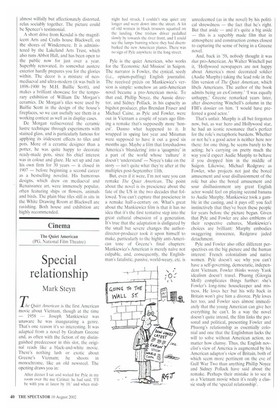Cinema
The Quiet American (PG, National Film Theatre)
Special relationship
Mark Steyn
he Quiet American is the first American movie about Vietnam, though at the time — 1958 — Joseph Mankiewicz was unaware he was inaugurating a genre. That's one reason it's so interesting. It was adapted from a novel by Graham Greene and, as often with the fiction of my distinguished predecessor in this slot, the original reads like a black-and-white movie. There's nothing lush or exotic about Greene's Vietnam; he shoots in monochrome, like an old newsreel. The opening draws you in:
After dinner I sat and waited for Pyle in my room over the rue Catinat: he had said, 'I'll be with you at latest by 10.' and when mid
night had struck. I couldn't stay quiet any longer and went down into the street. A lot of old women in black trousers squatted on the landing. One trishaw driver pedalled slowly by towards the river front, and I could see the lamps burning where they had disembarked the new American planes. There was no sign of Pyle anywhere in the long street.
Pyle is the quiet American, who works for the 'Economic Aid Mission' in Saigon. The narrator is Fowler, the cynical, seedy (i.e., opium-puffing) English journalist. The received precis on Mankiewicz's version is simple: somehow an anti-American novel became a pro-American movie. To that end, Phillip Noyce. the Aussie director. and Sidney Pollack, in his capacity as bigshot producer, plus Brendan Fraser and Michael Caine, as Pyle and Fowler, were out in Vietnam a couple of years ago filming a remake that's supposedly more 'honest'. Dunno what happened to it. It wrapped in spsing last year and Miramax were supposed to have it out a good six months ago. Maybe a film that foreshadows America's 'blundering' into a 'quagmire' in a part of the world whose 'culture' it doesn't `understand' — Noyce's take on the story — isn't quite what they're after at the multiplex post-September 11th.
But, even if it were, I'm not sure you can remake The Quiet American. The point about the novel is its prescience about the fate of the US in the two decades that followed. You can't capture that prescience in a remake half-a-century on. What's great about the Mankiewicz film is that it has no idea that it's the first tentative step into the great cultural obsession of a generation. It's true that the adaptation is disfigured by the small but severe changes the authordirector-producer took it upon himself to make, particularly to the highly anti-American tone of Greene's final chapters: Mankiewicz's American is merely naïve not culpable, and, consequently, the Englishman's fatalistic, passive, world-weary, etc. is
unredeemed (as in the novel) by his political shrewdness — the fact that he's right. But that aside — and it's quite a big aside — this is a superbly made film that in atmosphere and construction comes closest to capturing the sense of being in a Greene novel.
And, back in '58, nobody thought it was that pro-American. As Walter Winchell put it, 'Hollywood newspapers are not happy about America's most decorated soldier (Audie Murphy) taking the lead role in the film version of The Quiet American, which libels Americans. The author of the book admits being an ex-Cornmy.I was equally unhappy,' Greene remarked years later, after discovering Winchell's column in the FBI's dossier on him. 'I would have preferred a good actor.'
That's unfair. Murphy is all but forgotten now, but, as war hero and Hollywood star, he had an iconic resonance that's perfect for the role's metaphoric burdens. Whether or not he's a good actor is neither here nor there: for one thing, he seems barely to be acting; he's carrying on pretty much the way you'd expect Audie Murphy to behave if you dropped him in the middle of Saigon. Likewise, Michael Redgrave as Fowler, who projects not just the bored amusement and sour disillusionment of the role but also the bored amusement and sour disillusionment any great English actor would feel on playing second banana to Audie Murphy. Mankiewicz took a gamble in the casting, and it pays off: you feel instinctively that they've been these people for years before the picture began. Given that Pyle and Fowler are also emblems of their respective cultures, Mankiewicz's choices are brilliant: Murphy embodies swaggering innocence. Redgrave jaded detachment.
Pyle and Fowler also offer different perspectives on the big picture and the human interest: French colonialism and native women. Pyle doesn't see why you can't have a self-governing, democratic, independent Vietnam. Fowler thinks woozy Yank idealism doesn't travel. Phuong (Giorgia Moll) complicates things further: she's Fowler's long-time housekeeper and mistress. He loves her but his wife back in Britain won't give him a divorce. Pyle loves her too, and Fowler sees almost immediately that the young American can give her everything he can't. In a way the novel doesn't quite intend, the film links the personal and political, presenting Fowler and Phuong's relationship as essentially colonial and one that the Englishman lacks the will to solve without American action, no matter how clumsy. Thus, the English novelist's view of America is augmented by his American adaptor's view of Britain, both of which seem more pertinent on the eve of Gulf War Two than anything Phillip Noyce and Sidney Pollack have said about the remake. Perhaps their mistake is to see it as a Vietnam movie when it's really a classic study of the 'special relationship'.


























































 Previous page
Previous page